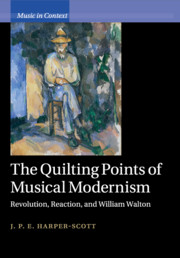1 - Modernism as we know it, ideology, and the quilting point
from PART I - A RUTHLESS CRITICISM OF EVERYTHING EXISTING
Published online by Cambridge University Press: 05 September 2012
Summary
Taruskin's erasure of modernism
Richard Taruskin's Oxford History of Western Music is the longest suicide note in musicological history. I mean this in a purely objective sense. Taruskin is one of the finest musicologists of his, and probably any other, generation. Yet the Oxford History is the End. It lays bare the entire thought of a career that has exercised as great a formative influence on the modern discipline as any other single writer, helped in no small part by his extrovert academic persona and fluent, if often orotund, prose style. The book's ready accessibility (and search-ability) in its new online version will ensure that the current generation of young musicologists, which like every new generation will see as its essential existential business the annihilation of its parents, can interrogate and supplant Taruskin's readings with a convenience that no earlier generation could dream of. In short, in the Oxford History, Taruskin completes his function as a vanishing mediator – a ‘catalytic agent which permits an exchange of energies between two otherwise mutually exclusive terms’ – between the old and coming forms of musicology.
Taruskin claims with justification that the fourth volume, which focuses on the early twentieth century (the principal period of ‘modernism’ as traditionally understood) is the one which ‘differs the most radically from previous accounts’, though the fact that he excludes the fifth volume (on the post-war period) from this suggests that he is blind to its elevation of an American Cold-War perspective to the level of historical objectivity (see §1.5 below).
- Type
- Chapter
- Information
- The Quilting Points of Musical ModernismRevolution, Reaction, and William Walton, pp. 3 - 42Publisher: Cambridge University PressPrint publication year: 2012



